Cuba protests: Three key issues that explain the rare unrest
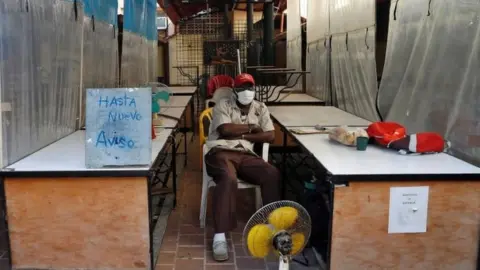 EPA
EPACuba has been plunged into turmoil by the largest protests against its Communist government in decades.
Thousands took to the streets in towns and cities across the island shouting "freedom" and "down with the dictatorship" on Sunday.
Protests are rarely seen on the Caribbean island, where opposition to the government is stifled.
"We are not afraid. We want change, we do not want any more dictatorship," one protester in San Antonio told the BBC.
So what have been the main drivers of these protests?
1) The coronavirus crisis
Sunday's protests appeared to be the result of societal exhaustion stemming from acute economic and health crises. The pandemic and economic measures taken by the government have made life in Cuba increasingly difficult.
The island, which had kept the Covid-19 pandemic under control in 2020, has seen infections explode in recent weeks.
On Sunday, the island officially reported 6,750 cases and 31 deaths, although many opposition groups say the true figures are likely to be far higher.
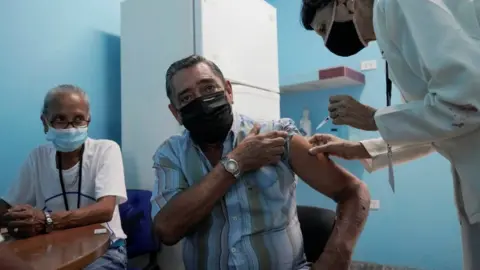 Reuters
ReutersLast week the country broke records for daily infections and deaths, pushing health centres to the point of collapse.
The BBC spoke to several Cubans who claim that their relatives died at home without the receiving medical care they needed.
This was the case for Lisveilis Echenique, who said her brother, 35, died at home because there was no room for him in hospital, and Lenier Miguel Pérez, who said his pregnant wife died due to what he alleged was "medical negligence".

More on Cuba:

Social media posts in recent days with the hashtag #SOSCuba have been calling for a humanitarian intervention to address what is seen as a critical situation on the island.
Thousands of Cubans joined in, while several videos of overwhelmed hospitals went viral.
In a message on Sunday, President Miguel Díaz-Canel said he considered the current coronavirus situation to be comparable to that of other countries.
He also stressed that Cuba had produced its own vaccines against the coronavirus (although the administration of doses is still limited in most areas).
2) The economic situation
With tourism - one of the engines of the Cuban economy - practically paralysed, the coronavirus pandemic has had a profound impact on the economic and social life of the island.
This has been compounded by growing inflation, blackouts, and shortages of food, medicine and basic products.
At the beginning of the year, the government proposed a new package of economic reforms that, while increasing wages, triggered a spike in prices.
Economists such as Pavel Vidal, from the Pontificia Javeriana University of Cali in Colombia estimate that prices could rise between 500% and 900% in the next few months.
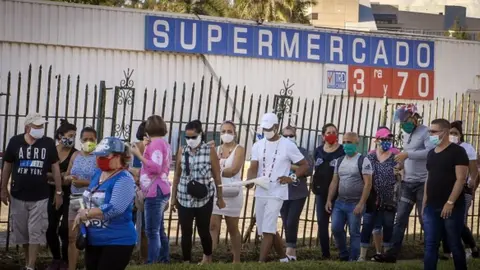 Getty Images
Getty ImagesSince last year, the government has opened shops where Cubans can buy food and basic necessities in foreign currencies, which there is a shortage of on the island.
But the shops have angered the majority of locals, who are paid in Cuban pesos, the national currency.
Long lines of Cubans queuing up to buy goods such as oil, soaps or chicken have become commonplace during the pandemic.
Basic medicines have become scarce in both pharmacies and hospitals and in many provinces they have begun to sell pumpkin-based bread due to the lack of wheat flour.
Cubans interviewed by the BBC last week said some medical centres do not have any aspirin, while the island has seen outbreaks of scabies and other infectious diseases.
Last month, the government said it would temporarily stop banks accepting cash deposits in dollars, the main currency that Cubans receive in remittances from abroad.
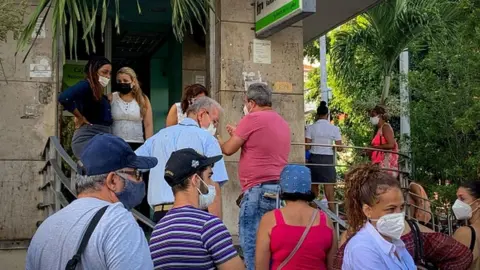 Getty Images
Getty ImagesThe move was seen by some economists as the most severe restriction imposed on the US currency since the government of the late president, Fidel Castro.
The government attributed the decision to tighter US sanctions that are restricting its ability to use the currency abroad.
In his TV address on Sunday, President Díaz-Canel said this was "the main problem that threatens the health and development of our people".
3) Internet access
Before Sunday, the largest protest Cuba had seen since the start of Castro's communist revolution took place in August 1994 on Havana's Malecón waterfront.
Many Cubans had no idea what had happened in the capital.
Thirty years on, though, the scenario is very different.
Under the presidency of Raúl Castro, Cuba took liberalising steps that led to greater internet connectivity on the island.
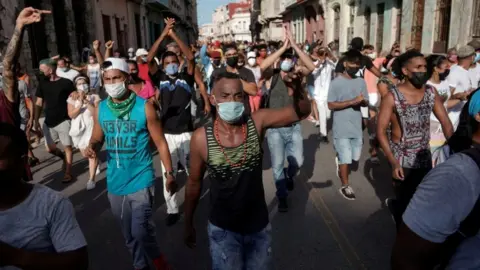 Reuters
ReutersSince then, Cubans have used social networks to express their dissatisfaction with the government.
Today, a large part of the population - mainly young people - have access to Facebook, Twitter and Instagram, which are their main sources of information from state and independent media.
These social networks have become platforms for artists, journalists and intellectuals to demand their rights or call for protests.
Indeed, Sunday's protests were partly organised on social media, where news of them spread.
The Cuban government says social networks are used by "enemies of the revolution" to create "destabilisation strategies" that follow CIA manuals.
While the protests were somewhat predictable, given the circumstances, what happens next is less so.
As Cuba faces an unprecedented crisis, the world will be watching to see how the government - and the Cuban people - react.
